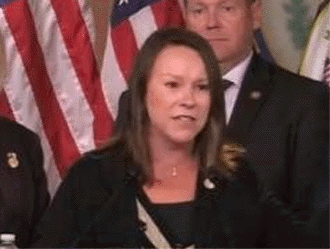By Brandon Moseley
Alabama Political Reporter
U.S. Representative Martha Roby recently wrote an editorial in ‘The Hill’ magazine with her concerns over automatic Defense spending cuts that were established in the 2011 Budget Control Act.
Rep. Roby said, “Our nation’s military is the most advanced and battle-hardened fighting force in history. The proficiency of the American men and women who serve in uniform is respected around the world. Their ability to get the job done is unmatched, and their sacrifice to our country is an inspiration to us all. So it’s disheartening to think that the greatest threat to the future of our force is not some foreign foe, but rather the U.S. Congress.”
Representative Roby continued, “Sequestration looms. Absent congressional action, automatic defense cuts will reduce the defense budget by $55 billion below the annual levels established in the Budget Control Act. That means an additional $500 billion in cuts will be imposed on top of the $487 billion already being implemented. In total, nearly $1 trillion will be cut over the next 10 years.”
Congresswoman Roby said, “Serious negotiations over the national debt limit led to the eventual passage of the Budget Control Act of 2011 (BCA), which was more of a political solution than a policy decision. The legislation imposed spending caps, raised the debt limit and created a bipartisan Select Joint Committee to find an additional $1.2 trillion in spending reductions. If the committee faltered, these cuts would be imposed automatically, half coming from defense accounts. (I opposed the plan for this reason.) Unfortunately, the committee ultimately failed, triggering about one-half trillion in defense cuts to start January 2013.”
Rep. Roby said, “Cuts of that severity are unacceptable, and Defense Department leaders have voiced serious warnings over the devastating effects they will cause. Defense Secretary Leon Panetta recently said, “Facing such large reductions, we would have to reduce the size of the military sharply. Rough estimates suggest after 10 years of these cuts, we would have the smallest ground force since 1940, the smallest number of ships since 1915, and the smallest Air Force in its history.””
Rep. Roby said, “There is broad acknowledgment that sequestration will be devastating but little urgency to do anything about it. There is neither a plan to repeal the automatic cuts nor to enforce them. As Panetta reportedly said, you “can’t plan for something that was designed to be crazy.””
Rep. Roby did say that there has been some positive actions recently. She cited as examples: the House’s passage of H.R. 5652 (the Sequestration, Replacement and Reconciliation Act) which would cancel the sequestration of defense spending currently scheduled for next year, replacing it with reductions to other discretionary programs and efforts by Sen. John McCain (R-Ariz.) to require the Defense Department and the Office of Management and Budget to outline the national security consequences of the budget sequestration required by the BCA.
Congresswoman Roby warned however, “With only 32 legislative days remaining prior to the election, the situation is growing more alarming. Conventional wisdom dictates that Washington will deal with sequestration in a lame-duck session, but Congress’s “to do” list for November is long: lawmakers must address the Bush tax cuts, the payroll tax holiday, a Medicare “doctors’ fix” and an omnibus spending bill. Even with each of these important issues on the table, sequestration is, arguably, the most pressing.” “The generals have raised the red flag on sequestration, the troops on the ground are well aware of its long-term effects and our military families are looking for answers. It’s time the president and the Congress make it a priority to reverse these ill-conceived automatic cuts.”
The U.S. National Debt is $15.8 trillion and is climbing at a rate of over $1.3 trillion a year. The largest outlay in the budget is Medicare and Medicaid at $802 billion a year. That is followed by Social Security at $739 billion a year, Defense is third at just $676 billion a year, fourth is income security at $376 billion. Income Security programs are wealth transfer payments in the form of supplemental security income, earned income tax credits, making work pay credits, nutrition assistance, child nutrition, and foster care. The government also spends $226 billion a year servicing the national debt and $214 billion on federal pensions.
Rep. Roby is a member of the House Armed Services Committee. The Congresswoman represents Alabama’s Second Congressional District.





















































